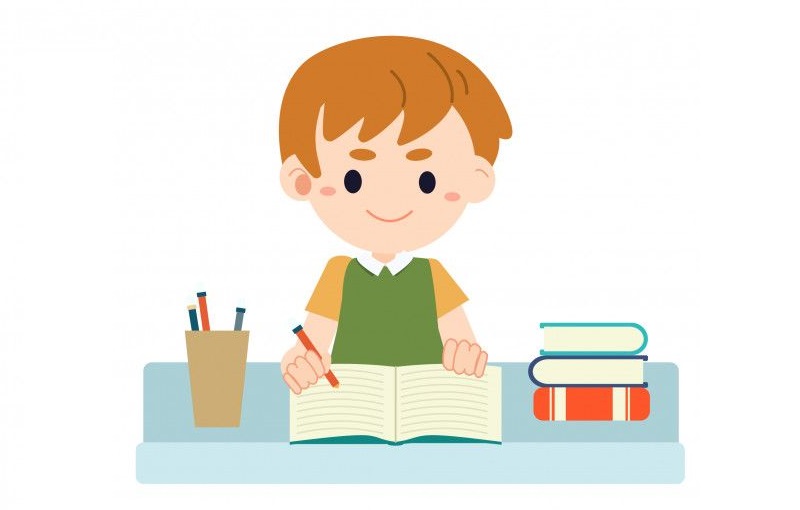Thì hiện tại đơn là một trong 12 thì trong tiếng Anh. Đây cũng là một trong những thì được sử dụng phổ biến nhất trong 12 thì bởi mức độ gần gũi của nhóm thì này với các sự việc trong đời sống.
Tuy nhiên, để có thể sử dụng đúng và chính xác đòi hỏi người học phải nắm vững kiến thức về thì. Ngay sau đây, hãy cùng Khoa Quốc Tế ôn tập lại kiến thức và áp dụng chúng vào các bài tập chia động từ thi hiện tại đơn nhé.
Thì hiện tại đơn là gì?

Định nghĩa
Thì hiện tại đơn dùng để diễn tả một thói quen, sự việc, một hành động lặp đi lặp lại hoặc diễn tả một sự thật, hiển nhiên, chân lý.
Công thức
| Động từ thường | Động từ to be | |
| Khẳng định | I You We They + V bare +O. He She It + Vs/es +O. Ex: I like ice cream. (Tôi thích kem). He goes to school by bike. (Anh ấy đến trường bằng xe đạp). Note: Đối với ngôi thứ ba số ít he, she, it động từ sẽ được thêm -s hoặc -es. Thêm -es sau các động từ có tận cùng là o, s, x, z, ch, sh . Thêm -s đối với những động từ còn lại. | S+ tobe (am/is/are)+ tính từ/ cụm danh từ. Ex: I am a student. (Tôi là một học sinh). She is a teacher. (Cô ấy là một giáo viên). |
| Phủ định | I/ You/ We/ They + Do not + V (bare). He/ She/ It + Does not + V (bare). Ex: I don’t like ice cream. (Tôi không thích kem). He doesn’t go to school by airplane. (Anh ấy không đi đến trường bằng trực thăng). Note: Do not = don’t Does not = doesn’t | S+ tobe (am/is/are)+ not + tính từ/ cụm danh từ. Ex: I am not a singer. (Tôi không phải là một ca sĩ). She is not a game designer. (Cô ấy không phải là một nhà thiết kế game). Note: Are not = aren’t Is not = isn’t |
| Nghi Vấn | Do + I/ You/ We/ They + V (bare)? Does + He/ She/ It + V (bare)? Ex: Do you like ice cream? (Bạn có thích kem không?) Does he go to school by car? (Anh ấy đến trường bằng xe ô tô phải không?) | Tobe(am/is/are)+ S+ tính từ/ cụm danh từ ? Ex: Are you a vet? (Bạn có phải là bác sĩ thú y không?) Is she a waitress? (Cô ấy là phục vụ bàn phải không?) |
Xem thêm: English Vocabulary in Use
Cách dùng thì hiện tại đơn
Có 4 cách dùng của thì hiện tại đơn:
Diễn tả một thói quen, một hành động được lặp đi lặp lại trong hiện tại.
Ex:
- I brush my teeth everyday. (Tôi đánh răng mỗi ngày).
- Mary always gets up early. (Mary luôn luôn dậy sớm).
- Do you read books every night? (Bạn có đọc sách mỗi tối không?)
Note: Cách dùng này thường đi với một số trạng từ chỉ tần suất như. (Always/ usually/ often/ sometimes/never).
Diễn tả một chân lý, hoặc một sự thật hiển nhiên.
Ex:
- The sun rises in the East and sets in the West. (Mặt trời mọc ở hướng Đông và lặn ở hướng Tây).
- The world is round. (Trái đất hình cầu).
Diễn tả một sự việc chắc chắn sẽ xảy ra trong tương lai. (Thường nói về thời gian biểu, kế hoạch, lịch trình đã được cố định).
Ex: The train leaves Ho Chi Minh at 8:30 am and arrives in Ha Noi at 23:00 pm. (Xe lửa sẽ rời Hồ Chí Minh lúc 8h30 sáng và sẽ đến Hà Nội vào lúc 23 giờ đêm).
Diễn tả trạng thái, cảm xúc hoặc tình trạng hiện tại của chủ thể.
Ex:
- I am thirsty. (Tôi khát nước).
- I smell something burning. (Tôi ngửi thấy có thứ gì đó đang cháy).
Dấu hiệu nhận biết thì hiện tại đơn
Trong câu có xuất hiện các trạng từ chỉ tần suất như:
| Always | Luôn luôn |
| Usually | Thường xuyên |
| Sometimes | Đôi khi |
| Often | Thỉnh thoảng |
| Never | Không bao giờ |
| Once a week | Một lần một tuần |
| Twice a week | Hai lần một tuần |
| Everyday | Hằng ngày/ mỗi ngày |
Xem thêm: Số thứ tự trong tiếng Anh
Bài tập chia động từ thì hiện tại đơn vận dụng

Bài 1. Bài tập chia động từ thì hiện tại đơn (thêm s/es)
- My uncle (work) ________ in a hospital.
- Cat (like) ________ fish.
- She (live)________ in London.
- It (rain)________ almost every morning in California.
- My sister (fry)________ eggs for breakfast everyday.
- The museum (close)________ at seven o’clock.
- Jack (try)________ hard in class, but I (not think) ________ he’ll pass.
- Jenny is so smart that she (pass)________ every exam without even trying.
- My life (be)_____ so boring. I just (watch)________ TV everyday.
- My boyfriend (write)________ to me two times a week.
- You (speak) ________ French?
- He (not live) ________ in Ha Noi city.
- Harry(eat)__________ an ice-cream a day.
- Violet_____________(hate) garlic.
- My mother (eat)__________ soup regularly.
- I usually _______ (walk) to school.
- They often_______ (visit) their grandparents.
- They _______ (play) basketball three times a week.
- Tom _______ (work) every day.
- My uncle always _______ (tell) me funny stories.
- He never _______ (help) me with that!
- Marry and Jace _______ (swim) twice a week.
- In this club people usually _______ (sing) a lot.
- Sam _______ (take care) of her sister.
- Alice rarely _______ (leave) the country.
- We _______ (live) in the village most of the year.
- Lona _______ (travel) to Paris every Sunday.
- I _______ (bake) cookies once a month.
- My brother always _______ (teach) me new things.
- She usually _______ (help) the kids of the neighborhood.
Key:
- My uncle works in a hospital.
- Cat likes fish.
- She lives in London.
- It rains almost every morning in California.
- My sister fries eggs for breakfast every day.
- The museum closes at seven o’clock.
- Jack tries hard in class, but I do not think he’ll pass.
- Jenny is so smart that she passes every exam without even trying.
- My life is so boring. I just watch TV every day.
- My boyfriend writes to me two times a week.
- Do you speak French?
- He does not live in Ha Noi city.
- Harry eats an ice cream a day.
- Violet hates garlic.
- My mother eats soup regularly.
- I usually walk to school.
- They often visit their grandparents.
- They play basketball three times a week.
- Tom works every day.
- My uncle always tells me funny stories.
- He never helps me with that!
- Marry and Jace swim twice a week.
- In this club people usually sing a lot.
- Sam takes care of her sister.
- Alice rarely leaves the country.
- We live in the village most of the year.
- Lona travels to Paris every Sunday.
- I bake cookies once a month.
- My brother always teaches me new things.
- She usually helps the kids of the neighborhood.
Xem thêm: Cấu trúc would rather
Bài 2: Dùng do/does hoặc do not/ does not hoàn thành các câu sau
- He _______ ride a car to his office.
- My friends _______ live in a big house.
- The cat _______ like me.
- They _______ do their homework on Saturday.
- Jacky_______ play baseball in the afternoons.
- The train _______ arrive at 5 a.m.
- We _______ go to bed at midnight.
- My sister _______ finish work at 6:30 p.m.
- I _______ like tea.
- My uncle_________like swimming.
- They_______ go to school on weekends.
- The bus _______ arrive at 7.30 a.m.
- My brother _______ play video games at 9 p.m.
- My mother _______ like dogs.
- I _______watch Tv in the morning.
Key:
- He doesn’t ride a bike to her office.
- My friends don’t live in a big house.
- The cat doesn’t like me.
- They don’t do their homework on Saturday.
- Jacky doesn’t play baseball in the afternoons.
- The train doesn’t arrive at 5 a.m.
- We don’t go to bed at midnight.
- My sister doesn’t finish work at 6:30 p.m.
- I don’t like tea.
- My uncle doesn’t like swimming.
- They don’t go to school on weekends.
- The bus doesn’t arrive at 7.30 a.m.
- My brother doesn’t play video games at 9 p.m.
- My mother doesn’t like dogs.
- I don’t watch Tv in the morning.
Bài 3: Chuyển những câu sau sang dạng phủ định và câu hỏi
1. She lives in New York.
- Câu phủ định: _____________________.
- Câu hỏi: _____________________?
2. Are they students?
- Câu khẳng định: _____________________.
- Câu phủ định: _____________________.
3. This is not the hair salon.
- Câu khẳng định: _____________________.
- Câu hỏi: _____________________?
4. Does Helen go to school by bus?
- Câu khẳng định: _____________________.
- Câu phủ định: _____________________.
Key:
1.
- Câu phủ định: She doesn’t live in New York.
- Câu hỏi: Does she live in New York?
2.
- Câu khẳng định: They are students.
- Câu phủ định: They are not students.
3.
- Câu khẳng định: This is the hair salon.
- Câu hỏi: Is this the hair salon?
4.
- Câu khẳng định: Helen goes to school by bus.
- Câu phủ định: Helen doesn’t go to school by bus.
Bài 4: Chia động từ thích hợp để hoàn thành đoạn văn sau (Kết hợp sử dụng thì hiện tại đơn và hiện tại tiếp diễn)
Cùng thực hiện bài tập điền động từ thích hợp để hoàn thành đoạn sử dụng kết hợp thì hiện tại đơn và hiện tại tiếp diễn.
Dear Linda! I _____________________ 1(write) this letter because it _____________________2 (seem) to me that far too many changes _____________________ 3(take) place in my country these days, and, as a result, we _____________________ 4(lose) our identity. I _____________________ 5(live) in a small village but even this village _____________________6 (change) before my eyes. For example, the authorities _____________________ 7(build) a burger place where my favourite restaurant used to be. Our culture _____________________ 8(belong) to everybody, and I _____________________ 9(not understand) why the village leaders _____________________ 10(not do) to preserve it. They simply _____________________ 11(not care). In fact, I _____________________ 12(think) of starting an action group. I _____________________ 13(appear) on a TV show on Saturday evening to make people aware of how important this issue is. It’s time for us to start doing something before it _____________________ 14(get) too late.
Key :
- Am writing
- Seems
- Are taking
- Are losing
- Lives
- Is changing
- Are building
- Belongs
- Don’t understand
- Aren’t doing
- Don’t care
- Am thinking
- Am appearing
- Gets
Kiến thức về thì luôn là một phần kiến thức mà bất kì người học tiếng Anh cũng cần phải nắm vững.
Bên cạnh việc học các lý thuyết, áp dụng những lý thuyết đó vào thực tế cũng là một phần rất quan trọng. Chỉ có việc sử dụng ngôn ngữ thường xuyên mới là phương pháp tốt nhất giúp chúng ta nhớ các kiến thức một cách lâu dài.
Trên đây, mình đã chia sẻ đến bạn một số cách chia động từ cũng như các dạng bài tập chia động từ thì hiện tại đơn để bạn có thể luyện tập thêm về nhóm thì này. Hy vọng bài đăng của mình sẽ giúp ích cho bạn.
Nếu bạn muốn Khoa Quốc Tế làm thêm bài tập về nhóm thì nào, hãy để lại bình luận cho chúng mình biết nhé!





